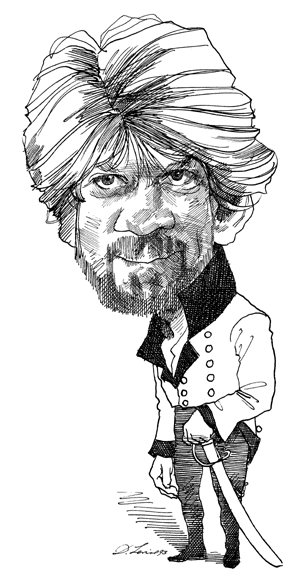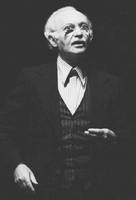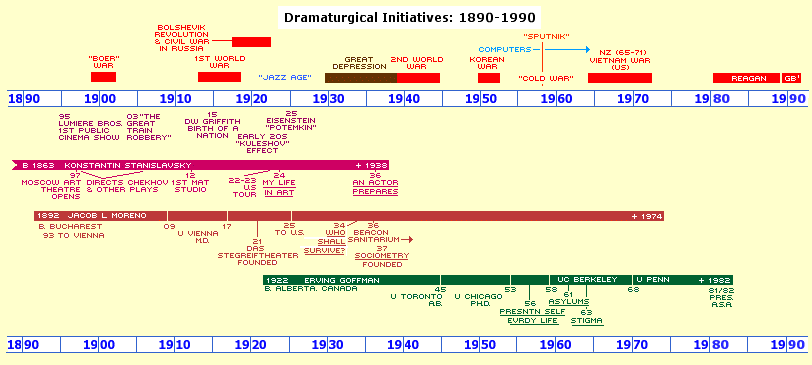
stanislavsky.us
Acting is an act and therefore must be an EVENT! Meyerhold @ Work *
Summary
Stanislavsky: «Remember this practical piece of advice: Never come into the theatre with mud on your feet. Leave your dust and dirt outside. Check your little worries, squabbles, petty difficulties with your outside clothing -- all the things that ruin your life and draw your attention away from your art -- at the door».Actors & Acting: "Thus far we have seen that the savage, failing to discern the limits of his ability to control nature, ascribes to himself and to all men certain powers which we should now call supernatural. Further, we have seen that, over and above this general supernaturalism, some persons are supposed to be inspired for short periods by a divine spirit, and thus temporarily to enjoy the knowledge and power of the indwelling deity. From beliefs like these it is an easy step to the conviction that certain men are permanently possessed by a deity, or in some other undefined way are endued with so high a degree of supernatural power as to be ranked as gods and to receive the homage of prayer and sacrifice. Sometimes these human gods are restricted to purely supernatural or spiritual functions. Sometimes they exercise supreme political power in addition. In the latter case they are kings as well as gods, and the government is a theocracy." Frazer
Questions
Training and Means: Relaxation, Concentration, Imagination, ObservationNotes
"The Paradox of the actor" --an essay written by Denis Diderot (1713-1784) -- begins to approach part of the actor's challenge: to appear real, the actor must be artificial. (Wilson, p. 108, tells us that Diderot endorsed more realistic prose dialog rather than verse.) 3 basic ingredients of the actor:1. native ability (talent)
2. training (including general education)
3. practice
"The basic essential of a great actor is that he loves himself in acting." --Charles Chaplin
Chekhov & BM: one act (On the High Road).
AUDITIONS:
Twelve Step Plan to Becoming an Actor in L.A.by Dawn Lerman
The Ultimate Audition Book for Teens: 111 One Minute Monologues (The Ultimate Audition Book for Teens, Volume 4) by Debbie Lamedman
More Alternative Shakespeare Auditions for Men by Simon Dunmore, William Shakespeare
Shakespeare for One: Women: The Complete Monologues and Audition Pieces by William Shakespeare, Douglas Newell (Editor)
Shakespeare for One: Men: The Complete Monologues and Audition Pieces by William Shakespeare, Douglas Newell (Editor)
Leading Women: Plays for Actresses II by Eric Lane (Editor), Nina Shengold (Editor)
Fifty African American Audition Monologues by Gus Edwards
How to Completely Blow Your Competition Away at Any Audition!: What by Caterina Christakos
Thank You Very Much: The Little Guide to Auditioning for the Musical Theater by Stuart Ostrow (Paperback - May 2002)
The Spirited Actor: Principles for a Successful Audition by Tracey Moore-Marable (Paperback - April 2002)
Audition Monologues: Power Pieces for Kids and Teens by Deborah Maddox (Paperback)
Audition Speeches for Younger Actors 16+ by Jean Marlow (Paperback)
The Audition Sourcebook: Do's, Don'ts, and an Online Guide to 2,100+ Monologues and Musical Excerpts by Randall Richardson, Don Sandley (Paperback)
Pocket Classics for Women by Ian Michaels (Editor), Roger Karshner (Paperback - November 2001)
An Actor's Dickens: Scenes for Audition and Performance from the Works of Charles Dickens by Beatrice Manley (Editor), Charles Dickens (Paperback - October 2001)
Audition Monologs for Student Actors 2: Selections from Contemporary Plays by Roger Ellis (Editor) (Paperback - October 2001)
Actor's Guide to Auditions and Interviews by Margo Annett (Paperback - September 2001)
Audition Speeches for Men by Jean Marlow, Elizabeth Ewing (Paperback - September 2001)
Scenes I'Ve Seen...: A Casting Director's Original Scenes and Interpretive Notes (Monologue and Scene Series) by Dorian Dunas (Hardcover - September 2001)
Auditioning: An Actor-Friendly Guide by Joanna Merlin, Harold Prince (Preface) (Paperback - May 2001)
Monologues for Women by Susan Pomerance (Paperback - April 2001)
Even More Monologues for Women by Women by Tori Haring-Smith (Editor) (Paperback)
Neil Simon Scenes: Scenes from the Works of America's Foremost Playwright by Neil Simon, Roger Karshner (Editor) (Paperback - October 2000)
The Monologue Audition: A Practical Guide for Actors by Karen Kohlhaas, David Mamet (Paperback)
The Sanford Meisner Approach: Workbook IV Playing the Part (The Sanford Meisner Approach) by Larry Silverberg (Paperback)
Outstanding Stage Monologs and Scenes from the '90s: Professional Auditions for Student Actors by Steven H. Gale (Editor) (Paperback - July 2000)
The Ultimate Audition Book for Teens: 111 One-Minute Monologues (Young Actors Series) by Janet B. Milstein (Paperback - July 2000)
More Alternative Shakespeare Auditions for Women by William Shakespeare, Simon Dunmore (Editor) (Paperback - May 2000)
Contemporary Scenes for Actors: Men by Michael Earley (Editor), et al (Paperback - December 1999)
How to Get the Part...Without Falling Apart! by Margie Haber, et al (Paperback - October 1999)
Audition Monologs for Student Actors: Selections from Contemporary Plays by Roger Ellis (Editor) (Paperback - August 1999)
Tight Spots: True-To-Life Monolog Characterizations for Student Actors by Diana M. Howie (Paperback - August 1999)
The Stage Directions Guide to Auditions (Heinemann's Stage Directions Series) by Stephen Peithman (Editor), et al (Paperback - April 1999)
Acting Scenes and Monologs for Young Women: 60 Dramatic Characterizations by Maya Levy (Paperback - March 1999)
Cold Reading and How to Be Good at It by Basil Hoffman (Paperback - February 1999)
Scenes for Women by Women by Tori Haring-Smith (Editor) (Paperback - February 1999)
Arthur Schnitzler : Four Plays (Great Translations for Actors Series) by Arthur Schnitzler, Carl R. Mueller (Translator) (Paperback - 1999)
Pocket Monologues: Working-Class Characters for Women by Susan Pomerance (Paperback - 1999)
The Flip Side: 64 Point-Of-View Monologs for Teens by Heather H Henderson, Ted Zapel (Editor) (Paperback - October 1998)
Great Scenes and Monologues for Actors by Michael Schulman (Editor), Eva Mekler (Editor) (Mass Market Paperback - September 1998)
The Theatre Audition Book: Playing Monologs from Contemporary, Modern, Period, Shakespeare and Classical Plays by Gerald Lee Ratliff (Paperback - September 1998)
Pocket Monologues for Men by Roger Karshner (Editor) (Paperback - July 1998)
Two-Minute Monologs : Original Audition Scenes for Professional Actors by Glenn Alterman, Theodore O. Zapel (Editor) (Paperback - June 1998)
The Perfect Monologue: How to Find and Perform the Monologue That Will Get You the Part by Ginger Friedman (Paperback - May 1998)
A Guide to Scenes & Monologues from Shakespeare and His Contemporaries by Kurt Daw, Julia Matthews (Paperback - April 1998)
Alternative Shakespeare Auditions for Men by Simon Dunmore (Editor), William Shakespeare (Paperback - March 1998)
Alternative Shakespeare Auditions for Women by Simon Dunmore (Editor), William Shakespeare (Paperback - March 1998)
For Women: Pocket Monologues from Shakespeare by William Shakespeare, et al (Paperback - January 1998)
Another Perfect Piece: Monologues from Canadian Plays by Tony Hamill (Editor) (Paperback - October 1997)
Pocket Monologues for Women by Susan Pomerance (Paperback - July 1997)
Monologues on Black Life by Gus Edwards (Paperback - February 1997)
Next!: An Actor's Guide to Auditioning by Ellie Kanner, et al (Paperback - January 1997)
Baseball Monologues by Lavonne Mueller (Editor), Lee Blessing (Introduction) (Paperback - September 1996)
Classical Audition Speeches for Men by Jean Marlow (Compiler) (Paperback - September 1996)
Classical Audition Speeches for Women by Jean Marlow (Paperback - September 1996)
More Monologues for Women by Women by Tori Haring-Smith (Editor) (Paperback - August 1996)
For Women: More Monologues They Haven't Heard by Susan Pomerance (Paperback - July 1996)
Kids Stuff by Ruth Mae Roddy (Paperback - July 1996)
Neil Simon Monologues: Speeches from the Works of America's Foremost Playwright by Neil Simon, et al (Paperback - July 1996)
Voices by Lydia Cosentino (Editor) (Paperback - July 1996)
The Audition Process: A Guide for Actors by Bob Funk (Paperback - April 1996)
Next: Auditioning for the Musical Theatre by Steven M. Alper, Herbert Knapp (Illustrator) (Paperback - February 1996)
The Contemporary Monologue: Men by Michael Earley (Editor), et al (Paperback - December 1995)
The Contemporary Monologue: Women by Michael Earley (Editor), et al (Paperback - September 1995)
Getting the Part: Thirty-Three Professional Casting Directors Tell You How to Get Work in Theater, Films, Commercials, and TV by Judith Searle (Paperback - September 1995)












